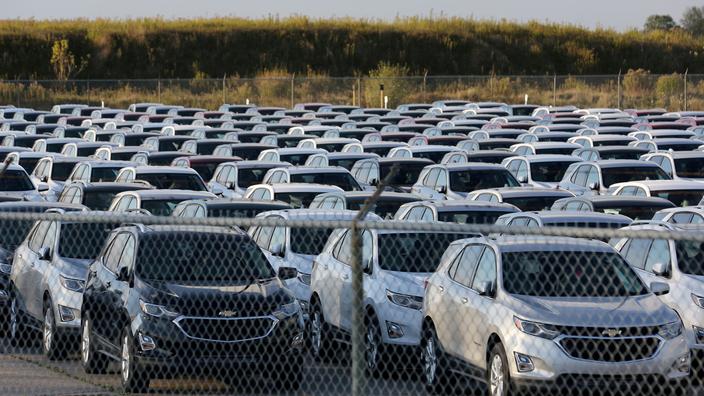Major automakers saw their sales jump in the United States in the second quarter, but the drop in available vehicles due to the persistent shortage of microchips is starting to be felt.
Read also :Semiconductors: the little chips that rule the world
Toyota took the lead, selling 688,813 units from April to June in the country after seeing its sales explode by 73% compared to the same period in 2020. More modestly, sales of General Motors (GM) increased by 40% to 688,236 units, and those of Fiat Chrysler USA (FCA US, a subsidiary of the Stellantis group) 32% to 485,312 units. Honda sales soared 66% to 486,419 units, Nissan’s 68% to 298,148 units and Hyundai’s 69% to 240,005 units. Ford will release its quarterly figures on Friday.
Over the same period in 2020, manufacturers were hit hard by restrictive measures slowing Americans’ travel and forcing many dealerships to close. Demand for vehicles subsequently picked up again, boosted by low interest rates, government assistance to households and the desire of many Americans for a private vehicle to get around and get away from it all. city centers. But a sign of some disruption in the market, Toyota and Honda saw their sales decline in June, respectively 14% and 13%, compared to the previous month. GM, which does not detail its figures month by month, said the limited number of vehicles available was holding back sales.
Shortage of electronic chips
“We are in an unusual period”, commented Michelle Krebs, Automotive Specialist for Cox Automotive. “Low stocks are starting to have an effect on sales: you can’t sell the products you don’t have”, she told AFP. In June, “We began to see customers who postponed their purchases because they could not find what they wanted or were put off by the high prices”, added the specialist.
Since the beginning of the year, the entire automotive sector has been facing a lack of electronic chips, elements that have become essential in the construction of cars. This has led them to temporarily halt production of certain vehicles, limiting supply at dealerships and driving up prices.
Consequence for GM: the number of vehicles available for sale was limited to 211,974 units at the end of June, against 334,628 units at the end of March and 809,387 at the end of June 2019, before the pandemic. “While the situation remains fluid, we strive to continue to take advantage of all available semiconductors to build and ship our most demanded products.”, especially pick-ups, said Kurt McNeil, GM’s sales manager in the United States. His counterpart at FCA-US, Jeff Kommor, for his part ensures that the group “Continues to work closely with its suppliers to mitigate the manufacturing impact of the various supply chain issues disrupting the automotive industry”. In this environment, GM prefers to sell its vehicles available to individuals, willing to pay more than companies: sales to professional fleets represented around 14% in the second quarter against around 20% before the pandemic.
Towards an alleviation of the shortage
The shortage of electronic chips “Should start to ease, but it will take time for production to get back on track and stocks to grow again”, avance michelle cancer. “The situation may start to improve in the fall, but it’s hard to predict.” IHS Markit, for its part, expects disruptions to continue in the third quarter, “But not at the scale seen in the first and second trimester”. “The situation is better and better understood and great efforts are being made to improve visibility within a very complex supply chain”, estimate its experts in a note.
– .


